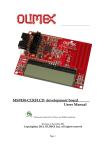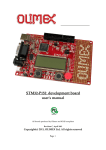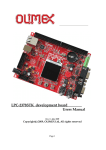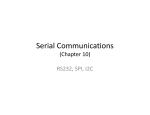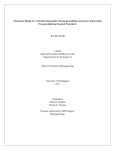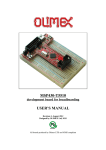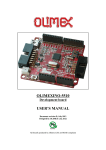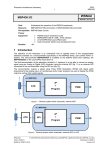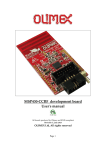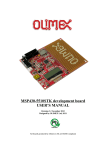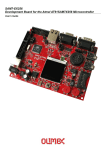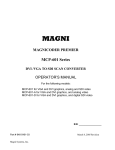Download MSP430-5438-STK User Manual
Transcript
MSP430-5438STK development board Users Manual All boards produced by Olimex are ROHS compliant Rev.A, October 2009 Copyright(c) 2009, OLIMEX Ltd, All rights reserved Page 1 INTRODUCTION MSP430-5438STK development board provides easy way for developing and prototyping with MSP430F5438 mixed signal microcontroller produced by Texas Instruments. This powerful microcontroller supports various serial interfaces such as USB Device, UART, SPI. In addition you will find also audio input and output, debug interface, LCD, UEXT, two Extensions, mini SD/MMC, User Joystick, User Leds, Reset button. All this allows you to build a diversity of powerful applications to be used in a wide range of situations. BOARD FEATURES - CPU: MSP430F5438 mixed signal microcontroller - LCD NOKIA 3310 black/white 84x48 pixels - JTAG connector - JTAG Power_In and Power_Out jumpers - Two extension connectors - UEXT connector - RS232 driver and connector - Power plug-in jack for 9V DC power supply - Voltage regulator +3.3V – VR1(3.3V) - 2 status LEDs - Power on Led - Audio In - Audio Out - SD/MMC mini connector - USB device connector - Reset button - User joystick - PCB: FR-4, 1.5 mm (0,062"), solder mask, silkscreen component print - Dimensions: 100x 98mm ( 3.94x 3.85") Page 2 ELECTROSTATIC WARNING The MSP430-5438STK board is shipped in protective anti-static packaging. The board must not be subject to high electrostatic potentials. General practice for working with static sensitive devices should be applied when working with this board. BOARD USE REQUIREMENTS Cables: The cable you will need depends on the programmer/debugger you use. If you use MSP430-JTAG, you will need LPT cable, if you use MSP430-JTAG-TINY or MSP-JTAG-ISO, you will need 1.8m A-B USB cable, if you use MSP430-JTAG-RF, you can connect it to the USB port of your computer, or via USB cable type A – female. Hardware: Programmer/Debugger – one of our Programmers – MSP430-JTAG, MSP430-JTAG-TINY, MSP430-JTAG-ISO, or MSP430-JTAG-RF. Software: MSP430 KickStart software. PROCESSOR FEATURES MSP430-5438STK board use ultralow-power consumption mixed signal microcontroller with these features: – 256KB+512B Flash Memory – 16KB RAM – Four Universal Serial Communication Interfaces – Low Supply Voltage Range – – 1.8 V to 3.6 V Ultralow Power Consumption – Active Mode (AM): 165 mA/MHz at 8 MHz – Standby Mode (LPM3 RTC Mode): 2.60 mA – Off Mode (LPM4 RAM Retention): 1.69 mA – Shutdown Mode (LPM5): 0.1 mA – Wake-Up From Standby Mode in Less Than 5 ms – 16-Bit RISC Architecture – – Extended Memory – 18-MHz System Clock Flexible Power Management System Page 3 – – Fully Integrated LDO With Programmable Regulated Core Supply Voltage – Supply Voltage Supervision, Monitoring, and Brownout Unified Clock System – FLL Control Loop for Frequency Stabilization – Low-Power/Low-Frequency Internal Clock Source (VLO) – Low-Frequency Trimmed Internal Reference Source (REFO) – 32-kHz Crystals – High-Frequency Crystals up to 32 MHz – 16-Bit Timer TA0, Timer_A With Five Capture/Compare Registers – 16-Bit Timer TA1, Timer_A With Three Capture/Compare Registers – 16-Bit Timer TB0, Timer_B With Seven Capture/Compare Shadow Registers – Up to Four Universal Serial Communication Interfaces – – Enhanced UART Supporting Auto-Baudrate Detection – IrDA Encoder and Decoder – Synchronous SPI – I2C™ 12-Bit Analog-to-Digital (A/D) Converter – Internal Reference – Sample-and-Hold – Autoscan Feature – 12 External Channels, 4 Internal Channels – Hardware Multiplier Supporting 32-Bit Operations – Serial Onboard Programming, No External Programming Voltage Needed – Three Channel Internal DMA – Basic Timer With Real-Time Clock Feature Page 4 BLOCK DIAGRAM Page 5 MEMORY ORGANIZATION Page 6 USB NA C48 NA C43 100nF C44+ 10uF/6.3V/T ANT Page 7 P_OUT HN1x2 2 1 2 1 #LCD_RES EXT1-28 A_OUT 67 66 65 61 60 59 58 57 MSP430F5438IPZ P8.7 P8.6/TA1.1 P8.5/TA1.0 P8.4/TA0.4 P8.3/TA0.3 P8.2/TA0.2 P8.1/TA0.1 P8.0/TA0.0 P7.7/A15 P7.6/A14 P7.5/A13 P7.4/A12 P7.3/TA1.2 P7.2/TB0OUTH/SVMOUT P7.1/XOUT P7.0/XIN P6.7/A7 P6.6/A6 P6.5/A5 P6.4/A4 P6.3/A3 P6.2/A2 P6.1/A1 P6.0/A0 P5.7/UCA1RXD/UCA1SOMI P5.6/UCA1TXD/UCA1SIMO P5.5/UCB1CLK/UCA1STE P5.4/UCB1SOMI/UCB1SCL P5.3/XT2OUT P5.2/XT2IN P5.1/VREF-/VEREFP5.0/VREF+/VEREF+ 8 7 6 5 56 55 14 13 4 3 2 1 100 99 98 97 54 53 52 51 90 89 10 9 50 49 48 47 46 45 44 43 A_IN C27 EXT2-33 EXT2-34 3.3VA 39pF 39pF C26 QCT32768(2x6)/6pF 100k 100k 100k R34 R35 UCB 0CLK UCB 0S O MI C37 47uF/6.3V/TANT 6 4 5 7 8 1 C15 AGND 3.3V SD/MMC MICRO CD/DAT3/CS CMD/DI VSS VDD CLK/SCLK DAT0/DO DAT1/RES DAT2/RES 10k 1M C12 470pF 2 3 R22 560R LED2 LED2 R39 33k http://www.olimex.com/dev COPYRIGHT(C), 2009 Rev. A C14 R23 4.7k UCA0TXD UCA0RXD UCB1SCL UCB1SDA UCA1SOMIR26 UCA1SIMO UCA1CLK UCA1STE B<4> DOWN C<3> RIGHT D<6> Common<5> A<1> E<2> Center push UP LEFT R42 33k R46 R43 33k 330R RIGHT BUT(R) COMMON UP BUT(U) J1 JOYSTICK_MT5_F BUT(L) LEFT R41 33k BH10S BH10S BH10S BH10S BH10S BH10S BH10S BH10S BH10S BH10S 3.3V UEXT-1 UEXT-2 UEXT-3 UEXT-4 UEXT-5 UEXT-6 UEXT-7 UEXT-8 UEXT-9 UEXT-10 USER JOYSTICK 220R R24 4.7k UEXT AGND 3.3V SCJ325P00XG0B02G 3-R 2 HEADPHONES 1-L 47uF/6.3V/TANT C11 AGND 3.3V 3.3V 3.3V BUT(C) R45 CENTER 330R BUT(D) DOWN R40 33k 3.3V MSP430-5438STK R21 560R LED1 LED1 USER LEDS + AGND 100nF 47uF/6.3V/TANT 5 8 3-R 2 MICROPHONE 1-L AGND 47uF/6.3V/TANT C2 AGND SCJ325P00XG0B02G C10 AGND R6 NA R3 10k R2 560R 3.3VA 100nF C6 47pF R8 100k C3 R1 100k 3.3VA U3 TS4871(SO-8) AGND 3 4 AGND C7 1uF R7 20k AGND 3.3VA AGND A_OUT R5 470k R12 47k 2.2uF 27k SD/MMC UCB 0S TE 2 UCB 0S IMO3 CL470nH/0805/1.76R/250mA R36 R37 R38 L2 UCB 0CLK UCB 0S O MI UCB 0S IMO UCB 0S TE 6 C1 100nF AGND 3.3VA UCA1SOMI,UCA1SIMO,UCA1STE,UCA1CLK,UCB1SDA,UCB1SCL,UCA0RXD,UCA0TXD,CS_SD 100nF EXT1-34 EXT1-33 EXT1-32 EXT1-31 AGNDAGNDAGND EXT1-30 EXT1-29 C28 10pF Q2 C29 10pF G ND C24 C25 Q18.000MHz/20pF Q1 EXT2-26 EXT2-27 EXT2-28 EXT2-29 EXT2-30 EXT2-31 EXT2-32 UCA1SOMI UCA1SIMO UCA1STE UCB1SCL EXT2-18 EXT2-19 EXT2-20 EXT2-21 EXT2-22 EXT2-23 EXT2-24 EXT2-25 3.3V EXT2-14 EXT2-15 EXT2-16 EXT2-17 UCB0STE,UCB0SIMO,UCB0CLK,UCB0SOMI AGND C13 2.2uF AGND R13 33nF 1k 1k C9 R10 R9 33nF C8 R11 20k AGND R15 33k R4 560R Z1 BZV55C2V4 Z2 BZV55C2V4 AGND 47pF C5 A_IN U2 MCP601-I/SN AUDIO GYX-SD-TC0805SYC(YELLOW) 1uF/16V/TANT ADG8448G(FPA-WZA-08-LF) C36 EXT1-22 EXT1-23 EXT1-24 EXT1-25 EXT1-26 EXT1-27 P9.7 P9.6 P9.5/UCA2RXD/UCA2SOMI P9.4/UCA2TXD/UCA2SIMO P9.3/UCB2CLK/UCA2STE P9.2/UCB2SOMI/UCB2SCL P9.1/UCB2SIMO/UCB2SDA P9.0/UCB2STE/UCA2CLK P10.7 P10.6 P10.5/UCA3RXD/UCA3SOMI P10.4/UCA3TXD/UCA3SIMO P10.3/UCB3CLK/UCA3STE P10.2/UCB3SOMI/UCB3SCL P10.1/UCB3SIMO/UCB3SDA P10.0/UCB3STE/UCA3CLK P4.7/TB0CLK/SMCLK P4.6/TB0.6 P4.5/TB0.5 P4.4/TB0.4 P4.3/TB0.3 P4.2/TB0.2 P4.1/TB0.1 P4.0/TB0.0 UCB1SDA UCA1CLK UCA0RXD UCA0TXD UCB0CLK UCB0SOMI UCB0SIMO UCB0STE EXT2-6 EXT2-7 EXT2-8 EXT2-9 EXT2-10 EXT2-11 EXT2-12 EXT2-13 0R(NA) + LCD 75 74 73 72 71 70 69 68 83 82 81 80 79 78 77 76 P11.2/SMCLK P11.1/MCLK P11.0/ACLK TEST/SBWTCK #RST/NMI/SBW/TDIO PJ.3/TCK PJ.2/TMS PJ.1/TDI/TCLK PJ.0/TDO P3.7/UCB1SIMO/UCB1SDA P3.6/UCB1STE/UCA1CLK P3.5/UCA0RXD/UCA0SOMI P3.4/UCA0TXD/UCA0SIMO P3.3/UCB0CLK/UCA0STE P3.2/UCB0SOMI/UCB0SCL P3.1/UCB0SIMO/UCB0SDA P3.0/UCB0STE/UCA0CLK 42 41 40 39 36 35 34 33 32 31 30 29 28 27 26 25 10uF/6.3V/TANT + UCB2CLK UCB2SIMO LCD_D/#C UCB2STE EXT1-19 EXT1-20 EXT1-21 LCD_D/#C #LCD_RES UCA2RXD UCA2TXD UCB2CLK UCB2SOMI UCB2SIMO UCB2STE LED1 LED2 UCA3RXD UCA3TXD 91 96 TEST #RST 86 85 84 95 94 93 92 TCK TMS TDI TDO AVSS AVCC P2.7/ADC12CLK/DMAE0 P2.6/ACLK P2.5 P2.4/RTCCLK P2.3/TA1.2 P2.2/TA1.1 P2.1/TA1.0 P2.0/TA1CLK/MCLK EXT2-4 EXT2-5 0R 1 2 3 4 5 6 7 8 3.3V TCK TMS TDI TDO EXT1-11 EXT1-12 EXT1-13 EXT1-14 EXT1-15 EXT1-16 EXT1-17 EXT1-18 EXT1-8 EXT1-9 EXT1-10 12 11 100nF AGND C23 VCORE DVSS1 DVSS2 DVSS3 DVSS4 EXT2-3 6 PC_DSR 7 PC_RTS 8 PC_CTS 9 R32 G2 NA G1 NA RS232 DB9-F 1 2 3 4 5 0R VDD SCK SDIN D/#C #SCE GND VOUT #RES R29 33k NA #RST EXT1-4 EXT1-5 EXT1-6 EXT1-7 C22 10uF/6.3V/TANT 62 15 63 37 88 BUT(L) BUT(R) BUT(C) BUT(U) BUT(D) PC_RXD PC_TXD PC_DTR C32 100nF C34 100nF R33 0R(NA) LCD R28 33k R18 100nF 100nF FB0805/600R/200mA(201209-601) L1 C19 C18 C21 470nF 100nF C17 24 23 22 21 20 19 18 17 13 8 14 7 6 2 R19 R27 33k BH14S 13 11 9 7 5 3 1 23 22 13 14 12 3.3VA 100nF C16 R1IN R2IN T1OUT T2OUT V- V+ ST3232(SO16) R1OUT R2OUT T1IN T2IN C2- C2+ P1.7 P1.6/SMCLK P1.5/TA0.4 P1.4/TA0.3 P1.3/TA0.2 P1.2/TA0.1 P1.1/TA0.0 P1.0/TA0CLK/ACLK 12 9 11 10 5 C1- R20 100nF P_IN HN1x2 JTAG TEST 100nF 14 12 10 8 6 4 2 7 25 33k GND1 AGND R17 18 3.3V GND2 TDI,TDO,TMS,TCK,#RST,TEST 26 21 DEBUG INTERFACE: CBUS0 CBUS1 CBUS2 CBUS3 CBUS4 TEST GND3 + C30 C45 3V3OUT NC1 #RESET NC2 OSCI OSCO 1 5 3 11 2 9 10 6 R30 330R DVCC4 DVCC3 DVCC2 DVCC1 U1 560R UCA2RXD R31 UCA2TXD 3 C35 4 100nF C1+ C33 100nF GND15 U4PWR 16VCC R25 3.3V C49 17 8 19 24 27 28 USBDM USBDP FT232RL R53 NA R52 + USB to RS232 10nF USB_B C50 16 15 TXD RXD RTS# CTS# DTR# DSR# DCD# RI# 87 38 64 16 #RST T1107A(6x3.8x2.5mm) RESET 220R C31 1 100nF U4 3.3V 2 7 S H IE LD 0R 0R(NA) 0R(NA) VCCIO VCC FT232RL/SSOP28 VDD_E CLOSE 2 4 20 1k PWREN 10uF/6.3V/TANT 3.3V AGND C20 2.2nF GND 0R 10k VCC FB /6 0 0 OHM /12 0 6(3 21 6 11 C -6 0 1) IRLML6402 U5 10uF/6.3V(NA) R49 + UCA3TXD UCA3RXD GYX-SD-TC0805SURK(RED) +5V_USB C47 2 CLOSE 1 100nF EXT1-2 AGND_E EXT2-2 C40 EXT2-1 C38 GND C46 2 47uF/6.3V/TANT 100nF 560R R47 + 1 1 6 1 2 R50 3 R51 4 + 47pF FET C42 1 CLOSE 1N4148 390R/1% 240R/1% PWR R14 33k R16 RS232 C4 R48 C41 100nF R44 1 4 L3 OUT 2 IN D1 ADJ/GND 3.3VA_E EXT1-1 RESET CIRCUIT 3.3V 3.3V 7 + USB DB104(SMD) C39 470uF/16VDC VR1(3.3V) LM1117IMPX-ADJ 3.3V_E CLOSE 3.3VA + 6VAC 9VDC 1N5819S G1 3.3V EXT1-3 YDJ-1134 PWR_JACK D2 POWER SUPPLY +5V_USB SCHEMATIC 33k GYX-SD-TC0805SGC(GREEN) UCB2CLK,UCB2SIMO,UCB2SOMI,UCB2STE,LCD_D/#C,#LCD_CS,#LCD_RES BOARD LAYOUT POWER SUPPLY CIRCUIT MSP430-5438STK can take power from three sources: – PWR connector where 9 V DC or 6 V AC is applied by external power source. – +5V_USB from USB DEV – JTAG, when P_IN jumper is closed. Note that the JTAG has current limitations. The board power consumption is: about 20 mA with all peripherals and microcontroller running at full speed. RESET CIRCUIT MSP430-5438STK reset circuit includes JTAG connector pin 11, EXT1 pin 3, MSP430F5438 pin 96 and Reset button. CLOCK CIRCUIT Quartz crystal 32768 MHz is connected to MSP430F5438 pin 13(P7.0/XIN) and pin 14 (P7.1/XOUT). Quartz crystal 18 MHz is connected to MSP430F5438 pin 89 (P5.2/XT2IN) and pin 90 (P5.3/XT2OUT). Page 8 JUMPER DESCRIPTION Power In jumper: P_IN jumper connects power supply from JTAG connector. You have to ensure that your circuit doesn't draw more than few milliampers current or the power supply may decrease due to the JTAG port current limitations. P_IN is useful and must be used mostly to program the microcontroller. Power Out jumper: P_OUT jumper connects power from MSP430-5438STK to JTAG connector. When this jumper cap is placed, the power supply of JTAG connector will follow the power supply of the board. This is useful when your board works at lower than +3,3V power supply. Note: P_IN and P_OUT jumper caps should not be placed at the same time. VDD_E Enable MSP430F5438 3.3 V power supply. Default state is closed. 3.3V_E Enable 3.3V board power supply. Default state is closed. 3.3VA_E Enable 3.3V board analog power supply. Default state is closed. AGND_E Enable board analog ground. Default state is closed. Input/Output User joystick with name J1 – this is 4 directions plus center button, in the schematic the joystick four directions switches are connected: UP, DOWN, LEFT, RIGHT through 33k resistors and CENTER through serial connected 330 and 33k resistors to 3.3V. Status LED (green) with name LED1 connected to MSP430F5438 pin 83 (P10.7). Status LED (yellow) with name LED2 connected to MSP430F5438 pin 82 (P10.6). Power supply LED (red) with name PWR – indicates that external power source is applied and board power supply is applied. Reset button with name RESET, connected to MSP430F5438 pin 96. LCD black/white 84x48 pixels Page 9 CONNECTOR DESCRIPTIONS JTAG Pin # Signal Name Pin # Signal Name 1 TDO 2 VCC_IN 3 TDI 4 VCC_OUT 5 TMS 6 NC 7 TCK 8 TEST 9 GND 10 NC 11 #RST 12 NC 13 NC 14 NC RS232 Pin # Signal Name 1 NC 2 PC_RXD 3 PC_TXD 4 PC_DTR 5 GND 6 PC_DSR 7 PC_RTS 8 PC_CTS 9 NC Page 10 USB DEV Pin # Signal Name 1 +5V_USB 2 USBDM 3 USBDP 4 GND PWR_JACK Pin # Signal Name 1 Power Input 2 GND UEXT Pin # Signal Name 1 3.3V 2 GND 3 UCA0TXD 4 UCA0RXD 5 UCB1SCL 6 UCB1SDA 7 UCA1SOMI 8 UCA1SIMO 9 UCA1CLK 10 UCA1STE Page 11 EXT1 Pin # Signal Name Pin # Signal Name 1 3.3V 2 GND 3 #RST 4 TCK 5 TMS 6 TDI 7 TDO 8 P11.2 9 P11.1 10 P11.0 11 LED1 12 LED2 13 UCA3RXD 14 UCA3TXD 15 P10.3 16 P10.2 17 P10.1 18 P10.0 19 UCB2CLK 20 UCB2SOMI 21 UCB2SIMO 22 P8.7 23 P8.6 24 P8.5 25 P8.4 26 P8.3 27 P8.2 28 P8.0 29 P7.2 30 P7.3 31 P7.4 32 P7.5 33 P7.6 34 P7.7 Page 12 EXT2 Pin # Signal Name Pin # Signal Name 1 3.3VA 2 AGND 3 P1.7 4 P1.1 5 P1.0 6 P2.7 7 P2.6 8 P2.5 9 P2.4 10 P2.3 11 P2.2 12 P2.1 13 P2.0 14 UCB0CLK 15 UCB0SOMI 16 UCB0SIMO 17 UCB0STE 18 P4.7 19 P4.6 20 P4.5 21 P4.4 22 P4.3 23 P4.2 24 P4.1 25 P4.0 26 P6.6 27 P6.5 28 P6.4 29 P6.3 30 P6.2 31 P6.1 32 P6.0 33 P5.0 34 P5.1 Page 13 SD/MMC Pin # Signal Name 1 Pull-up 2 UCB0STE 3 UCB0SIMO 4 VDD (power supply) 5 UCB0CLK 6 GND 7 UCB0SOMI 8 Pull-up 9 Not connected 10 Not connected 11 Not connected 12 Not connected Microphone Pin # Signal Name 1 AGND 2 NC 3 MIC Headphone Pin # Signal Name 1 AGND 2 IN1=IN2 3 IN2=IN1 Page 14 MECHANICAL DIMENSIONS Page 15 AVAILABLE DEMO SOFTWARE – Display demo – LEDs and Buttons demo – SD/MMC demo – UART demo – USB UART demo – ADC and DAC demo Page 16 ORDER CODE MSP430-5438STK – assembled and tested (no kit, no soldering required) How to order? You can order to us directly or by any of our distributors. Check our web www.olimex.com/dev for more info. Revision history: REV.A - October 2009 Initial release REV. B - March 2012 Changes: Page 13 - Changed wrong signal names in the table with the correct ones (signals #14,15,16,17) Page 17 Disclaimer © 2009 Olimex Ltd. All rights reserved. Olimex®, logo and combinations thereof, are registered trademarks of Olimex Ltd. Other terms and product names may be trademarks of others. The information in this document is provided in connection with Olimex products. No license, express or implied or otherwise, to any intellectual property right is granted by this document or in connection with the sale of Olimex products. Neither the whole nor any part of the information contained in or the product described in this document may be adapted or reproduced in any material from except with the prior written permission of the copyright holder. The product described in this document is subject to continuous development and improvements. All particulars of the product and its use contained in this document are given by OLIMEX in good faith. However all warranties implied or expressed including but not limited to implied warranties of merchantability or fitness for purpose are excluded. This document is intended only to assist the reader in the use of the product. OLIMEX Ltd. shall not be liable for any loss or damage arising from the use of any information in this document or any error or omission in such information or any incorrect use of the product. Page 18


















